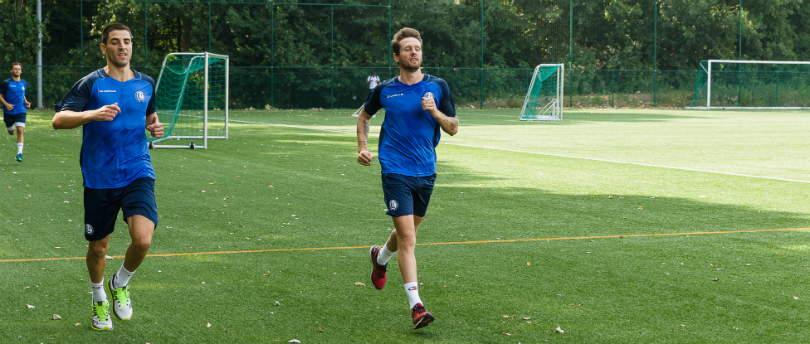Premier League v amateur fitness
New data released by Catapult Sports has revealed the difference between the fitness of Premier League and amateur players

Have you ever wondered what the difference is between professional and Sunday League fitness? Well, new data has revealed how much further and faster football’s best athletes run compared to amateur players.
Catapult Sports – who provide wearable technology to hundreds of clubs, including Real Madrid, AC Milan, PSG, Chelsea and Bayern Munich – have compared stats from an amateur side with an anonymous Premier League team.

Top speed
Using a Playertek fitness tracking device, Catapult found that professional forwards run 21% quicker than amateur players, with the average maximum speeds of pro attackers coming in at 9.2 metres per second, compared to 7.5 metres per second for a player at amateur level. Some attackers, such as Southampton’s Shane Long, Leicester City’s Jamie Vardy and Manchester United’s Marcus Rashford achieve higher than this and rack up speeds of 9.8mps, 9.75mps and 9.78mps.
Professionals are, on average across all positions, only 20% faster than amateur players. An amateur can power through at 7.17 metres per second, compared to elite level whereas professionals can reach 8.48 metres per second.
Catapult’s sports scientist, Chris Barnes, said: “Though the numbers unsurprisingly show that professionals are faster, we must acknowledge that some amateurs will, in fact, be quicker than some professionals. This is, in part, due to genetics - a large component of an individual’s potential to achieve high running speeds is inherited. However, the training undertaken by professional players ensures most, if not all, can reach their genetic potential’.
“In many professional games, players won’t actually reach maximum speed - something to be applauded as this is often related to their capacity to ‘read’ and manage a game. However, if circumstances dictate, that extra speed is there to be called upon.”
However, Barnes notes that there is a clear difference between professional midfielders, with Catapult data from the Premier League team finding that the average top speed of a winger is nine metres per second, somewhat higher than the average of 7.9 metres per second for a centre-midfield player. Generally speaking, players will ‘migrate’ to play in positions for which they are physically and technically best suited, and the demands of top level wide play require players who possess high inherent speed.”
Get FourFourTwo Newsletter
The best features, fun and footballing quizzes, straight to your inbox every week.
Distance run
Total distance run provides a global representation of volume of exercise and is also a simple way to assess individual’s contribution to a team effort. In a standard 90-minute Premier League game, players cover on average 10.5km, 34% more than the 7.8km covered by their amateur counterparts.
Barnes highlights that the difference can be attributed to many factors. “Game and running efficiency, technical factors, game ‘smartness’, and to a certain extent, differences in fitness, all play a role in differentiating between the demands of different levels of the game. The greater technical proficiency of professional players results in greater match ‘tempo’ and the ball being in play for a much greater proportion of a match, both of which are contributory factors in their superior running performances.”
When broken down by position, these differences become even more apparent; whilst large differences are evident between professional and amateur attackers (c25%) and midfielders (c35%), a huge differential is observed between professional defenders and their amateur counterparts (45% at 10.5km vs 7.27km respectively). Barnes notes that the evolution of the modern professional game results in defenders joining in much of the attacking plays of a team, something that is perhaps not as evident at the amateur level of the sport.
Barnes concludes by highlighting that in football in particular, “more isn’t necessarily better. It depends on circumstances, such as position, opposition and environmental factors on the day. The key is that professionals have the capacity for greater performances, but due to greater collective efficiency and football smartness, are not always called upon to draw upon these reserves.”
With Playertek, as an amateur footballer you can track how far you run, how fast you run, where you go on the pitch, how many sprints you make and how long they are. Using its intelligent software, you can then compare your performance against colleagues and professionals alike.

‘Sir Gary Lineker? I don’t know how you comment on that – I’ve never even considered it. I just try to stand up for the things I believe in’ England legend tells FFT why he won’t stop raising humanitarian issues, even if it affects potential honours

'I fell on the floor and shouted for a penalty. Someone pulled me up and said, "Don’t cheat to win penalties". It was Steve McManaman. I never did it again!' Ex-Liverpool forward reveals harsh lesson he learnt from his team-mate on Reds debut







